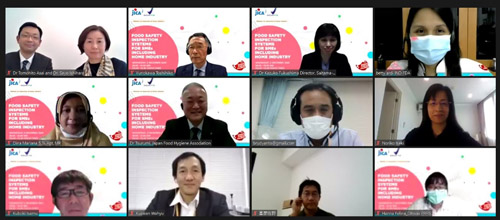- Home
- Technical Cooperation Projects
- Index of Countries
- Asia
- Indonesia
- Project for Enhancing Drug and Food Safety
- Project News
- Challenges of food safety inspection to SMEs
Project News
2020-12-02
Challenges of food safety inspection to SMEs
A primary work of food inspectors is to ensure compliance with rules and regulations, and it should, in turn, result in safe food being served. Besides, the inspectors require the highest quality of interaction and communication to teach food safety principle to food industry, particularly small and medium-sized enterprises. SMEs, as substantial contributors to the economic growth in Indonesia, are facing many challenges for food safety compliance, for instance, lack of competence for full applications of good manufacturing practice standards, improper record keeping/documentation and hygiene/sanitation control of facilities.
The webinar held on 2 December 2020 aims to share experiences on food inspection for SMEs and home industry. To better understand similarities and differences on food safety enforcement, authority and inspection between Japan and Indonesia, six speakers involved in public or private regulatory activities and food safety inspection were invited:
- Dr Kazuko Fukushima, Director in Saitama-city municipal government;
- Ms Dina Mariana, SSi, Apt, MP, Head of Sub Directorate for Low Risk Food Control Badan POM;
- Drs Sayo Ishihara & Tomohito Asai, Food Safety Inspection Division, Aichi prefectural government;
- Dr Kazuhiko Tsurumi, Director of Japan Food Hygiene Association (JFHA); and
- Dr Toshihiko Younokawa, Chief Senior researcher at National Institute of Public Health (NIPH).
Dr Fukushima briefed the new food safety regulation fully enforced in 2021 to all food companies, inclusive of SMEs and home industry. There is a clear delineation of competence between the central and local governments in the regulatory framework. Local authorities, adhering to the national policy, are entirely responsible for conducting food safety inspection. The latest criteria on food processing facilities are designed based on functions of premises, not on structural specifications, to allow for more flexible and tailor-made establishments of SMEs. Besides, private organizations have developed food safety guidelines for different food categories, stipulating default control methods applicable to SMEs and home industry which have lack of capability and human resources. More than 90 guidelines have been reviewed and authorized by the central government.
Ms Dina Mariana highlighted the constraints and challenges faced by SMEs in Indonesia. Their numerous real or perceived barriers include: poor documentation systems; improper personal hygienic and sanitation controls resulting in exposures to microorganisms; use of excessive food additives; and incompliance construction to GMP. She stressed the need of efforts to improve the national food control system through synergized supervisions at the central and regional levels.
Dr Tsurumi focused on private sector's activities implemented in collaboration with the governmental and other related organizations. To promote effective self-managements of food industries, various forms of educational materials have been elaborated, for instance, awareness programmes addressed to SMEs as well as school children for proper hygienic control and prevention of infectious diseases caused by microorganisms, e.g., noroviruses. Awarding programmes are also available to assign Master of proper hand washing practitioners. They have also promoted more effective and well-designed handwashing educational programmes, using handwash-checkers and hand-lotions, to visualize hand contamination right away. The "Five-Star programme" to improve hygiene control of SMEs, shops and restaurants since 2013 has been proven to reduce the potential food poisoning cases, and it, therefore, can be a convincing promotional strategy to consumer.
The two lecturers from Aichi prefectural government more focus on food safety inspections in its administration. Based on its annual inspection plan, local inspectors follow comprehensive procedures in investigating food facilities. They are required to make intelligible suggestions and advice to SMEs, and, thus, need high qualifications or skills in communication. In recent investigation records, most failures of SMEs observed are derived from improper food handling and handwashing, as well as unhygienic facilities and poor wastewater treatments. For collection of food samples for laboratory testing, the inspectors follow fixed sampling methods, sample sizes/volumes, and sample treatment (transport and storage conditions). Testing item - food combinations are designed based on data of hazards and of probable risks accumulated in their jurisdictional examinations.
Dr Younokawa emphasized the role of NIPH in training food safety inspectors with significant roles to support SMEs and home industry. He recalled an outcome of the panel discussion, which was held among representatives of universities, research institutes, industries, consumer and relevant stakeholders, in the course of reinforcing the food regulation. The panel has suggested, to ensure applications of a coherent food inspection and advice to SMEs, provision of consistent training programmes in the entire country. NIPH, thus, regularly updates training modules considering latest risk/hazard data and other food safety factors associated with new and emerged science and technologies. The training programmes include socializing activities in terms of better communication between food inspectors and SMEs with limited technical literacy on food safety.
Approximately 300 local food inspectors and regulators from health offices and technical implementation units of Badan POM participated in the webinar.

Related Link
- About JICA
- News & Features
- Countries & Regions
- Our Work
- Thematic Issues
- Types of Assistance
- Partnerships with Other Development Partners
- Climate Change / Environmental and Social Considerations
- Evaluations
- Compliance and Anti-corruption
- Science and Technology Cooperation on Global Issues
- Research
- JICA Development Studies Program / JICA Chair
- Support for the Acceptance of Foreign HRs / Multicultural and Inclusive Community
- Publications
- Investor Relations
